学而思-初中英语面试试讲(一般现在时)
初中英语2024届中考语法复习一般现在时和一般将来时知识讲解
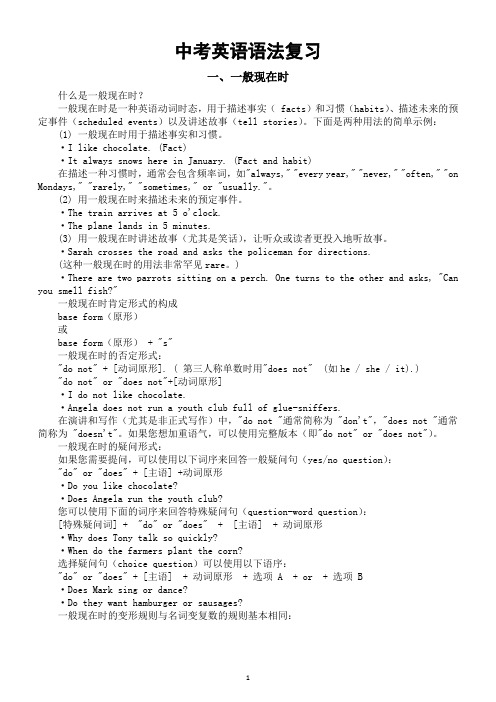
中考英语语法复习一、一般现在时什么是一般现在时?一般现在时是一种英语动词时态,用于描述事实( facts)和习惯(habits)、描述未来的预定事件(scheduled events)以及讲述故事(tell stories)。
下面是两种用法的简单示例:(1) 一般现在时用于描述事实和习惯。
·I like chocolate. (Fact)·It always snows here in January. (Fact and habit)在描述一种习惯时,通常会包含频率词,如"always," "every year," "never," "often," "on Mondays," "rarely," "sometimes," or "usually."。
(2) 用一般现在时来描述未来的预定事件。
·The train arrives at 5 o'clock.·The plane lands in 5 minutes.(3) 用一般现在时讲述故事(尤其是笑话),让听众或读者更投入地听故事。
·Sarah crosses the road and asks the policeman for directions.(这种一般现在时的用法非常罕见rare。
)·There are two parrots sitting on a perch. One turns to the other and asks, "Can you smell fish?"一般现在时肯定形式的构成base form(原形)或base form(原形) + "s"一般现在时的否定形式:"do not" + [动词原形]. ( 第三人称单数时用"does not" (如he / she / it).)"do not" or "does not"+[动词原形]·I do not like chocolate.·Angela does not run a youth club full of glue-sniffers.在演讲和写作(尤其是非正式写作)中,"do not "通常简称为 "don't","does not "通常简称为 "doesn't"。
最新学而思英语一般现在时讲义及练习
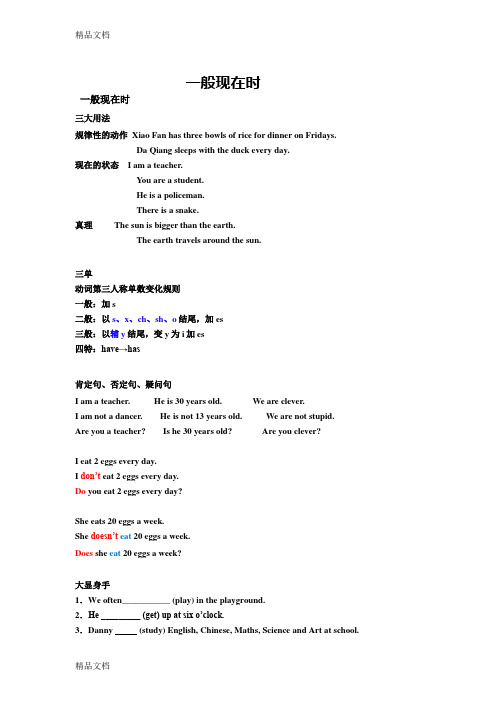
一般现在时一般现在时三大用法规律性的动作 Xiao Fan has three bowls of rice for dinner on Fridays.Da Qiang sleeps with the duck every day.现在的状态 I am a teacher.You are a student.He is a policeman.There is a snake.真理 The sun is bigger than the earth.The earth travels around the sun.三单动词第三人称单数变化规则一般:加s二般:以s、x、ch、sh、o结尾,加es三般:以辅y结尾,变y为i加es四特:have→has肯定句、否定句、疑问句I am a teacher. He is 30 years old. We are clever.I am not a dancer. He is not 13 years old. We are not stupid.Are you a teacher? Is he 30 years old? Are you clever?I eat 2 eggs every day.I don’t eat 2 eggs every day.Do you eat 2 eggs every day?She eats 20 eggs a week.She doesn’t eat 20 eggs a week.Does she eat 20 eggs a week?大显身手1.We often___________ (play) in the playground.2.He _________ (get) up at six o’clock.3.Danny (study) English, Chinese, Maths, Science and Art at school.4.She often __________ (watch) TV with her dog.5.__________ you_________ (brush) your teeth every morning?6.What (do) he usually (do) after school?1.I have many books. (改为否定句)2.Da Shan’s sister likes playing table tennis. (改为否定句)3.I watch TV every day. (改为一般疑问句)4.Yu Paopao is the cleverest student in her class. (改为否定句)Keys: 1.play 2.gets 3.studies 4.watches 5.Do, brush 6.does, do1.I don’t have many books.2.Da Shan’s sister doesn’t like playing table tennis.3.Do you watch TV every day?4.Yu Paopao is not the cleverest student in her class.测试题一、写出下列动词的第三人称单数形式get ________________ sit ________________come ________________ drive _________________fly _________________ study _________________wash _________________ watch _________________go ________________ do _________________二、单项选择1.Where _________ he _________ from?A.is, come B.do, comeC.does, come D.is, from2.We _____________ any Chinese classes on Friday.A.don’t has B.doesn’t haveC.don’t have D.are have3.Wang Mei __________ music and often ___________ to music.A.like; listen B.likes; listensC.like; are listening D.liking; listen4.We will go shopping if it____________ tomorrow.A.don't rain B.didn't rainC.doesn't rain D.isn't rain5.Jenny ____________ in an office. Her parents ____________in a hospital.A.work ; works B.works ; workC.work ; are working D.is working ; work三、句型变化1.Tony watches TV every evening. (改为否定句)_______________________________.2.Amy likes playing computer games. (改为一般疑问句)_______________________________?3.Tom does his homework at home. (对划线部分提问)_______________________________?4.Mingming likes taking photos in the park.(对划线部分提问)_______________________________?5.Sun Yang washes some clothes on Saturday.否定句: __________________一般疑问句: _________________________肯定/ 否定回答 __________________ / _____________________ 划线提问: _______________________________?。
一般现在时语法讲解讲课讲稿
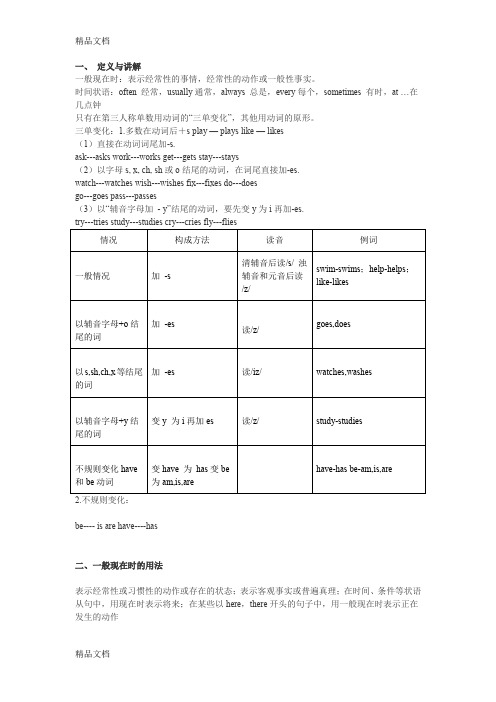
一、定义与讲解一般现在时:表示经常性的事情,经常性的动作或一般性事实。
时间状语:often 经常,usually通常,always 总是,every每个,sometimes 有时,at …在几点钟只有在第三人称单数用动词的“三单变化”,其他用动词的原形。
三单变化:1.多数在动词后+s play — plays like — likes(1)直接在动词词尾加-s.ask---asks work---works get---gets stay---stays(2)以字母s, x, ch, sh或o结尾的动词,在词尾直接加-es.watch---watches wish---wishes fix---fixes do---doesgo---goes pass---passes(3)以“辅音字母加- y”结尾的动词,要先变y为i再加-es.try---tries study---studies cry---cries fly---flies情况构成方法读音例词一般情况加-s 清辅音后读/s/ 浊辅音和元音后读/z/swim-swims;help-helps;like-likes以辅音字母+o结尾的词加-es读/z/goes,does以s,sh,ch,x等结尾的词加-es 读/iz/ watches,washes以辅音字母+y结尾的词变y 为i再加es 读/z/ study-studies不规则变化have 和be动词变have 为has变be为am,is,arehave-has be-am,is,are2.不规则变化:be---- is are have----has二、一般现在时的用法表示经常性或习惯性的动作或存在的状态;表示客观事实或普遍真理;在时间、条件等状语从句中,用现在时表示将来;在某些以here,there开头的句子中,用一般现在时表示正在发生的动作1) 经常性或习惯性的动作,常与表示频度的时间状语连用。
学而思英语一般现在时讲义及练习
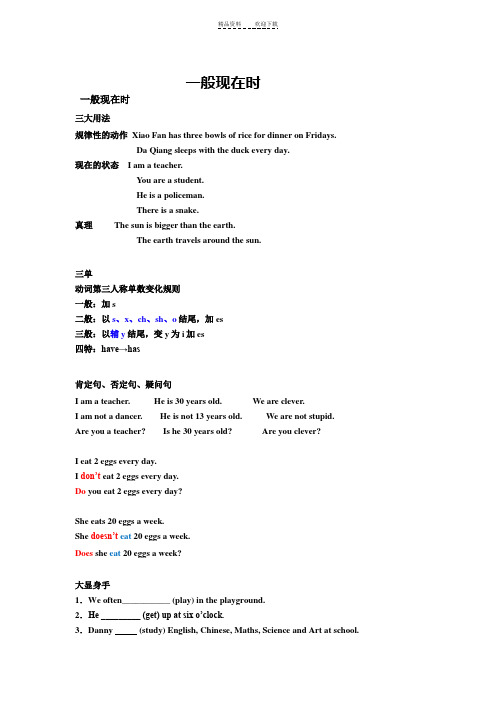
一般现在时一般现在时三大用法规律性的动作 Xiao Fan has three bowls of rice for dinner on Fridays.Da Qiang sleeps with the duck every day.现在的状态 I am a teacher.You are a student.He is a policeman.There is a snake.真理 The sun is bigger than the earth.The earth travels around the sun.三单动词第三人称单数变化规则一般:加s二般:以s、x、ch、sh、o结尾,加es三般:以辅y结尾,变y为i加es四特:have→has肯定句、否定句、疑问句I am a teacher. He is 30 years old. We are clever.I am not a dancer. He is not 13 years old. We are not stupid.Are you a teacher? Is he 30 years old? Are you clever?I eat 2 eggs every day.I don’t eat 2 eggs every day.Do you eat 2 eggs every day?She eats 20 eggs a week.She doesn’t eat 20 eggs a week.Does she eat 20 eggs a week?大显身手1.We often___________ (play) in the playground.2.He _________ (get) up at six o’clock.3.Danny (study) English, Chinese, Maths, Science and Art at school.4.She often __________ (watch) TV with her dog.5.__________ you_________ (brush) your teeth every morning?6.What (do) he usually (do) after school?1.I have many books. (改为否定句)2.Da Shan’s sister likes playing table tennis. (改为否定句)3.I watch TV every day. (改为一般疑问句)4.Yu Paopao is the cleverest student in her class. (改为否定句)Keys: 1.play 2.gets 3.studies 4.watches 5.Do, brush 6.does, do1.I don’t have many books.2.Da Shan’s sister doesn’t like playing table tennis.3.Do you watch TV every day?4.Yu Paopao is not the cleverest student in her class.测试题一、写出下列动词的第三人称单数形式get ________________ sit ________________come ________________ drive _________________fly _________________ study _________________wash _________________ watch _________________go ________________ do _________________二、单项选择1.Where _________ he _________ from?A.is, come B.do, comeC.does, come D.is, from2.We _____________ any Chinese classes on Friday.A.don’t has B.doesn’t haveC.don’t have D.are have3.Wang Mei __________ music and often ___________ to music.A.like; listen B.likes; listensC.like; are listening D.liking; listen4.We will go shopping if it____________ tomorrow.A.don't rain B.didn't rainC.doesn't rain D.isn't rain5.Jenny ____________ in an office. Her parents ____________in a hospital.A.work ; works B.works ; workC.work ; are working D.is working ; work三、句型变化1.Tony watches TV every evening. (改为否定句)_______________________________.2.Amy likes playing computer games. (改为一般疑问句)_______________________________?3.Tom does his homework at home. (对划线部分提问)_______________________________?4.Mingming likes taking photos in the park.(对划线部分提问)_______________________________?5.Sun Yang washes some clothes on Saturday.否定句: __________________一般疑问句: _________________________肯定/ 否定回答 __________________ / _____________________划线提问: _______________________________?。
初一一般现在时态精讲讲解
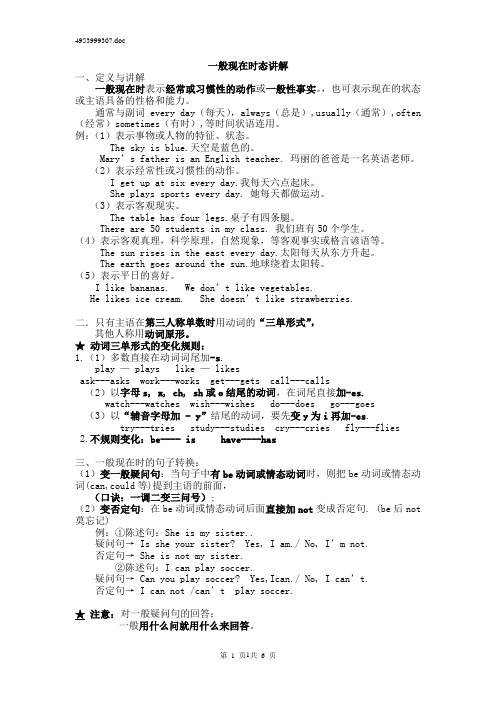
一般现在时态讲解一、定义与讲解一般现在时表示经常或习惯性的动作或一般性事实。
,也可表示现在的状态或主语具备的性格和能力。
通常与副词every day(每天),always(总是),usually(通常),often (经常)sometimes(有时),等时间状语连用。
例:(1)表示事物或人物的特征、状态。
The sky is blue.天空是蓝色的。
Mary’s father is an English teacher. 玛丽的爸爸是一名英语老师。
(2)表示经常性或习惯性的动作。
I get up at six every day.我每天六点起床。
She plays sports every day. 她每天都做运动。
(3)表示客观现实。
The table has four legs.桌子有四条腿。
There are 50 students in my class. 我们班有50个学生。
(4)表示客观真理,科学原理,自然现象,等客观事实或格言谚语等。
The sun rises in the east every day.太阳每天从东方升起。
The earth goes around the sun.地球绕着太阳转。
(5)表示平日的喜好。
I like bananas. We don’t like vegetables.He likes ice cream. She doesn’t like strawberries.二.只有主语在第三人称单数时用动词的“三单形式”,其他人称用动词原形。
★动词三单形式的变化规则:1.(1)多数直接在动词词尾加-s.play — plays like — likesask---asks work---works get---gets call---calls(2)以字母s, x, ch, sh或o结尾的动词,在词尾直接加-es.watch---watches wish---wishes do---does go---goes (3)以“辅音字母加 - y”结尾的动词,要先变y为i再加-es.try---tries study---studies cry---cries fly---flies2.不规则变化:be---- is have----has三、一般现在时的句子转换:(1)变一般疑问句:当句子中有be动词或情态动词时,则把be动词或情态动词(can,could等)提到主语的前面,(口诀:一调二变三问号);(2)变否定句:在be动词或情态动词后面直接加not变成否定句. (be后not 莫忘记)例:①陈述句:She is my sister..疑问句→ Is she your sister? Yes, I am./ No, I’m not.否定句→ She is not my sister.②陈述句:I can play soccer.疑问句→ Can you play soccer? Yes,Ican./ No, I can’t.否定句→ I can not /can’t play soccer.★注意:对一般疑问句的回答:一般用什么问就用什么来回答。
小升初英语语法专题精讲学案 一般现在时(难度简单)(含答案)
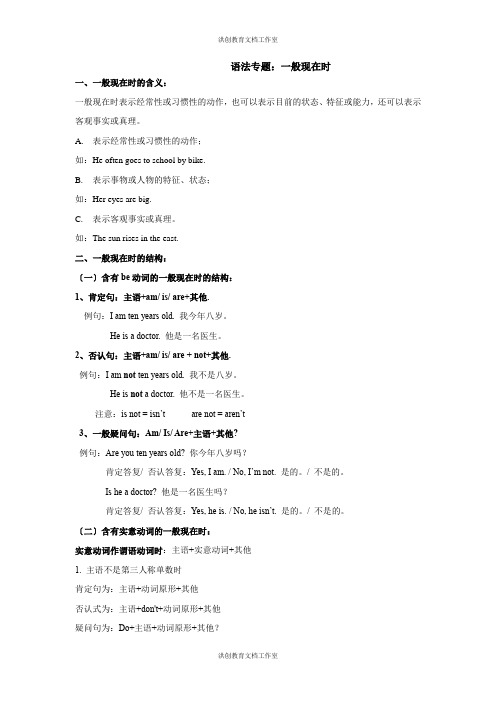
语法专题:一般现在时一、一般现在时的含义:一般现在时表示经常性或习惯性的动作,也可以表示目前的状态、特征或能力,还可以表示客观事实或真理。
A.表示经常性或习惯性的动作;如:He often goes to school by bike.B.表示事物或人物的特征、状态;如:Her eyes are big.C.表示客观事实或真理。
如:The sun rises in the east.二、一般现在时的结构:〔一〕含有be动词的一般现在时的结构:1、肯定句:主语+am/ is/ are+其他.例句:I am ten years old. 我今年八岁。
He is a doctor. 他是一名医生。
2、否认句:主语+am/ is/ are + not+其他.例句:I am not ten years old. 我不是八岁。
He is not a doctor. 他不是一名医生。
注意:is not = isn’t are not = aren’t3、一般疑问句:Am/ Is/ Are+主语+其他?例句:Are you ten years old? 你今年八岁吗?肯定答复/ 否认答复:Yes, I am. / No, I’m not. 是的。
/ 不是的。
Is he a doctor? 他是一名医生吗?肯定答复/ 否认答复:Yes, he is. / No, he isn’t. 是的。
/ 不是的。
〔二〕含有实意动词的一般现在时:实意动词作谓语动词时:主语+实意动词+其他1. 主语不是第三人称单数时肯定句为:主语+动词原形+其他否认式为:主语+don't+动词原形+其他疑问句为:Do+主语+动词原形+其他?肯定答复/否认答复:Yes, 主语+do. / No, 主语+ don’t.例句:I like Chinese.I don’t like Chinese.Do you like Chinese? Yes, I do. / No, I don’t.〔三〕含有情态动词的一般现在时的结构〔以情态动词can为例〕:1、肯定句:主语+can+动词原形+其他.例句:The monkeys can climb trees. 猴子会爬树。
初中英语语法——一般现在时讲解
初中英语时态——一般现在时讲解一般现在时主要用法1.表示经常性、习惯性的动作或者状态标志性词:every、always、usually、often、sometimes、seldom、never I get up at 7 every day.我每天7点起床。
That girl usually walks to school.那个女孩通常步行上学。
2.表示科学真理、有规律的自然现象Light travels faster than sound.光速比声速快。
The sun rises in the east.太阳从东方升起。
3.表示目前的状态、喜好等I am a student.我是一名学生。
My father likes reading books.我父亲喜欢读书。
4.if条件状语从句和when时间状语从句:主将从现He will go to the park if it is sunny tomorrow.如果明天天气晴朗,他将去公园。
区别:I wonder if it will be sunny tomorrow.我想知道明天天气是否晴朗。
一般现在时句型结构1.谓语是be动词(am/is/are)①肯定句:主语+be动词+其他.I am fifteen years old.You are a clever boy.She is an English teacher.②否定句:主语+be动词+not+其他.I am not fifteen years old.You are not a clever boy.She is not an English teacher.③一般疑问句:Be动词+主语+其他?肯定回答:Yes,主语+be动词.否定回答:No, 主语+ be动词+not.—Are you fifteen years old?—Yes,I am./No,I'm not.—Is she an English teacher?—Yes, she is./No, she isn't.④特殊疑问句:特殊疑问词+be动词+主语+其他? Where are they?2.谓语动词是实义动词主语是第一人称、第二人称、第三人称复数:①肯定句:主语+动词原形+其他.I have a lot of interesting books.You look nice in the dress.They go shopping every weekend.②否定句:主语+don't+动词原形+其他.I don't have a lot of interesting books.You don't look nice in the dress.They don't go shopping every weekend.③一般疑问句:Do+主语+动词原形?肯定回答:Yes,主语+do.否定回答:No, 主语+ don't.—Do you have a lot of interesting books?—Yes, I do./ No, I don't.④特殊疑问句:特殊疑问词+do+主语+动词原形+其他? When do you go to school?What do they like?主语是第三人称单数:①肯定句:主语+动词第三人称单数+其他.He has a short black hair.Helen likes juice.②否定句:主语+doesn't+动词原形+其他.He doesn't have short black hair.Helen doesn't like juice.③一般疑问句:Does+主语+动词原形+其他?肯定回答:Yes,主语+does.否定回答:No, 主语+doesn't.—Does he have short black hair?—Yes, he does./No, he doesn't.④特殊疑问句:特殊疑问词+does+主语+动词原形+其他? Which subject does your sister like best?Where does he often go after school?3. 谓语是情态动词①肯定句:主语+情态动词+动词原形+其他.I can draw beautiful pictures.He can speak English well.They can borrow some magazines from the library.②否定句:主语+情态动词+not+动词原形+其他.I can't draw beautiful pictures.He can't speak English well.They can't borrow some magazines from the library.③一般疑问句:情态动词Can+主语+动词原形?肯定回答:Yes,主语+情态动词.否定回答:No, 主语+ 情态动词+not.—Can you play volleyball?—Yes,I can./No, I can't.④特殊疑问句:特殊疑问词+情态动词+主语+动词原形+其他?回答:主语+情态动词+动词原形+其他.—What can you do?—I can play the piano.第三人称单数一、人称代词he, she, it是第三人称单数。
(完整)一般现在时讲解与练习(初中英语)
一般现在是讲解与练习一般现在时讲解与练习一般现在时表示经常或习惯性的动作或一般性事实。
平时与副词 every day〔每天〕,always〔总是〕 ,usually〔平时〕 ,often〔经常〕 sometimes〔有时〕 ,等时间状语连用。
1.表示事物或人物的特色、状态。
如:The sky is blue.天空是蓝色的。
2.表示经常性或习惯性的动作。
如:I get up at six every day我.每天六点起床。
3.表示客观现实。
如: The earth goes around the sun地.球绕着太阳转。
4.表示平时的喜好。
I like bananas.We don’tlike vegetables.构成: 1. be 动词:主语 +be(am,is,are)+其他。
如:I am a boy.我是一个男孩。
2.行为动词:主语 +行为动词 (+其他 )。
如:We study English.我们学习英语。
当主语为第三人称单数 (he, she,it)时,要在动词后加 "-s"或"-es"或变“ y〞为“ ies〞如: Mary likes Chinese.玛丽喜欢汉语。
Miss Gu teaches us English.顾老师教我们英语。
She studies Chinese every day她.每天学习语文。
否认句、一般疑问句、特别疑问句:1. be 动词的变化。
否认句:主语 + be + not +其他。
如: He is not a worker.他不是工人。
一般疑问句: Be +主语 +其他。
如: -Are you a student?-Yes. I am. / No, I’m not.特别疑问句:疑问词 +一般疑问句。
如: Where is my bike?2.行为动词的变化。
否认句:主语 + don’t( doesn’t ) +动词原形 (+其他 )。
初中一般现在时讲解
初中一般现在时讲解初中一般现在时是英语中最基础的时态之一,也是我们在日常生活中最常使用的时态之一。
通过初中一般现在时的运用,我们可以描述当前的状况、习惯、经常发生的动作和普遍真理等。
在本文中,我们将重点讲解初中一般现在时的使用规则和一些注意事项。
一、基本的初中一般现在时结构初中一般现在时的基本结构为:主语 + 动词原形(第三人称单数要加-s)+ 其他成分。
例如:- I play soccer after school.(我放学后踢足球。
)- He watches TV every evening.(他每天晚上看电视。
)- They eat lunch at 12 o'clock.(他们在12点吃午饭。
)二、陈述句的变化规则1. 第三人称单数形式在初中一般现在时中,第三人称单数(he、she、it或名词单数)的动词要变为原形加上-s。
例如:- She sings very well.(她唱得很好。
)- He plays basketball with his friends.(他和他的朋友们一起打篮球。
)- The dog barks loudly at strangers.(这条狗对陌生人叫得很大声。
)2. 不可数名词和复数名词与不可数名词一起使用时,动词保持原形。
与复数名词一起使用时,动词也保持原形。
例如:- The water tastes good.(水的味道很好。
)- The boys play soccer every Saturday.(这些男孩每个星期六踢足球。
)3. 特殊的第三人称单数形式以s、x、ch、sh和o结尾的名词通常在第三人称单数形式中加-es。
例如:- The bus goes to the city center.(这辆公交车开往市中心。
)- A box of candies is on the table.(桌子上有一盒糖果。
)- She brushes her teeth after meals.(她餐后刷牙。
最新(清华附中内部专用)学而思英语一般现在时讲义及练习
一般现在时一般现在时三大用法规律性的动作 Xiao Fan has three bowls of rice for dinner on Fridays.Da Qiang sleeps with the duck every day.现在的状态 I am a teacher.You are a student.He is a policeman.There is a snake.真理 The sun is bigger than the earth.The earth travels around the sun.三单动词第三人称单数变化规则一般:加s二般:以s、x、ch、sh、o结尾,加es三般:以辅y结尾,变y为i加es四特:have→has肯定句、否定句、疑问句I am a teacher. He is 30 years old. We are clever.I am not a dancer. He is not 13 years old. We are not stupid.Are you a teacher? Is he 30 years old? Are you clever?I eat 2 eggs every day.I don’t eat 2 eggs every day.Do you eat 2 eggs every day?She eats 20 eggs a week.She doesn’t eat 20 eggs a week.Does she eat 20 eggs a week?大显身手1.We often___________ (play) in the playground.2.He _________ (get) up at six o’clock.3.Danny (study) English, Chinese, Maths, Science and Artat school.4.She often __________ (watch) TV with her dog.5.__________ you_________ (brush) your teeth every morning?6.What (do) he usually (do) after school?1.I have many books. (改为否定句)2.Da Shan’s sister likes playing table tennis. (改为否定句)3.I watch TV every day. (改为一般疑问句)4.Yu Paopao is the cleverest student in her class. (改为否定句)Keys: 1.play 2.gets 3.studies 4.watches 5.Do, brush 6.does, do1.I don’t have many books.2.Da Shan’s sister doesn’t like playing table tennis.3.Do you watch TV every day?4.Yu Paopao is not the cleverest student in her class.测试题一、写出下列动词的第三人称单数形式get ________________ sit ________________come ________________ drive _________________fly _________________ study _________________wash _________________ watch _________________go ________________ do _________________二、单项选择1.Where _________ he _________ from?A.is, come B.do, comeC.does, come D.is, from2.We _____________ any Chinese classes on Friday.A.don’t has B.doesn’t haveC.don’t have D.are have3.Wang Mei __________ music and often ___________ to music.A.like; listen B.likes; listensC.like; are listening D.liking; listen4.We will go shopping if it____________ tomorrow.A.don't rain B.didn't rainC.doesn't rain D.isn't rain5.Jenny ____________ in an office. Her parents ____________in a hospital.A.work ; works B.works ; workC.work ; are working D.is working ; work三、句型变化1.Tony watches TV every evening. (改为否定句)_______________________________.2.Amy likes playing computer games. (改为一般疑问句)_______________________________?3.Tom does his homework at home. (对划线部分提问)_______________________________?4.Mingming likes taking photos in the park.(对划线部分提问)_______________________________?5.Sun Yang washes some clothes on Saturday.否定句: __________________一般疑问句: _________________________肯定/ 否定回答 __________________ / _____________________ 划线提问: _______________________________?。
- 1、下载文档前请自行甄别文档内容的完整性,平台不提供额外的编辑、内容补充、找答案等附加服务。
- 2、"仅部分预览"的文档,不可在线预览部分如存在完整性等问题,可反馈申请退款(可完整预览的文档不适用该条件!)。
- 3、如文档侵犯您的权益,请联系客服反馈,我们会尽快为您处理(人工客服工作时间:9:00-18:30)。
时态介绍
Part 1
一般现在时(The simple present tense)
表示经常性、规律性或习惯性的动作或状态。
Part 2时态结构
Form 1:句子结构为:主语+动词+其他。
三人称单数做主语,动
词用三单形式;其他人称做主语,动词用原形。
eg:I like eating apples
She likes eating apples
否定式:主语+don't/doesn’t+动词原形+其它
疑问句:Do/Does+主语+动词原形+其它?
Form 2:主+系动词/be动词+其他.根据主语人称选择be动词
1
231The earth goes around the sun.(主语+动词+其他)The sun rises from the east and sets
from the west every day (主语+动词+其他)
表示客观真理与名言警句Failure is the mother of success.(主+系动词/be 动词+表语)
1232I am a teacher. I am a mother (主/be 动词+表语)
She is a shy girl.(主+系动词/be 动词+表语)
表示目前的情况,能力、
性格和状态等We are hungry and thirsty.(主/be 动词+表语)
1233I go to school at 7o’clock every morning .(主语+动词+其他)
They often play basketball after shool.(主语+动词+其他)
表示经常性或习惯性的动
作,经常与表示频率的副
词连用。
We have six classes every day.(主语+动词+其他)
标志词汇
12
3
every day/morning/week/month/year 每天/早上/周/月/年
once/twice a week 一周一次/两次usually 通常often 经常always 总是
sometimes 有时
never 从来不
Part 4
学以致用
Part 5
用动词的恰当形式填空
1.We often_____play____(play)on the playgound.
2.He________(get)up at six o’clock.
3.Mike and his father sometimes _______(read) newspapers
together.
4.At eight,he________(watch)TV with his parents。
5.Mike sometimes__________(go)to the park with his sister.
汇报人:xxx 时间2020年2月20日某教培机构面试试讲。
